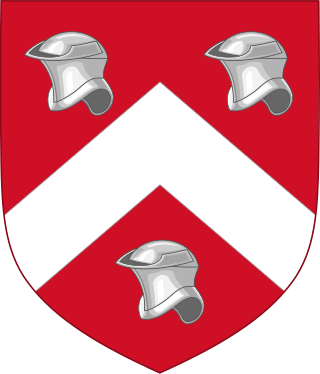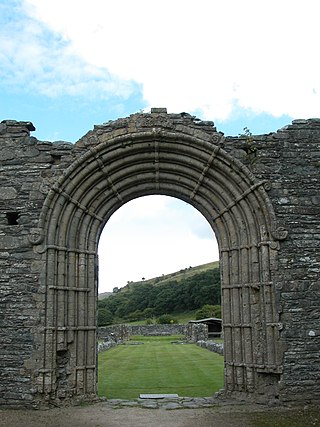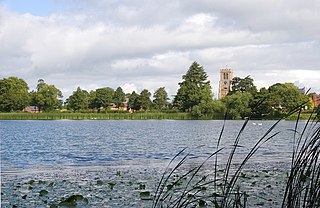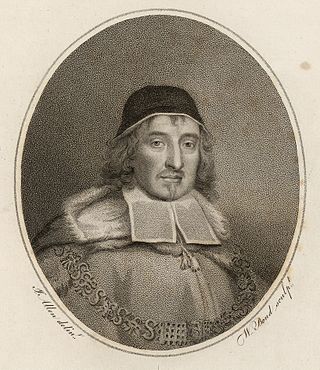Related Research Articles

Sir Owen Tudor was a Welsh courtier and the second husband of Queen Catherine of Valois (1401–1437), widow of King Henry V of England. He was the grandfather of Henry VII, founder of the Tudor dynasty.

Strata Florida Abbey is a former Cistercian abbey situated just outside Pontrhydfendigaid, near Tregaron in the county of Ceredigion, Wales. The abbey was founded in 1164. Strata Florida is a Latinisation of the Welsh Ystrad Fflur; 'Valley of Flowers'; the Welsh word ystrad is synonymous with strath and dale, while fflur ("flower") is also the name of the nearby river. After the region around St Davids was firmly occupied by the Norman Marcher lordship of Pembroke by the early 12th century, with St Davids firmly under Norman influence thereafter, the princely Dinefwr family of Deheubarth transferred their patronage to Strata Florida, and interred many of their family members there.

Earl of Lisburne is a title in the Peerage of Ireland. It was created in 1776 for Wilmot Vaughan, 4th Viscount Lisburne. He represented Cardiganshire and Berwick-upon-Tweed in the House of Commons and held minor governmental office.

Sir David Hanmer, KS, SL (c.1332–1387) was a fourteenth century Anglo-Welsh Justice of the King's Bench from Hanmer, Wales, best known as Owain Glyndŵr's father-in-law and the father of Glyndŵr's chief supporters.

Llywelyn ap Gruffydd Fychan of Caeo was a wealthy Carmarthenshire landowner who was executed in Llandovery by Henry IV of England in punishment for his support of Owain Glyndŵr's Welsh rebellion.
Ernest Augustus Vaughan, 4th Earl of Lisburne, styled Viscount Vaughan from 1820 to 1831, was a prominent landowner in Cardiganshire, Wales, who served from 1854 until 1859 as a Conservative member of the British House of Commons.
Sir Gruffudd Vychan, also spelt in English sources as Griffith Vaughan, was a Welsh knight who supported the rebellion of Owain Glyndŵr against the English, captured the Lollard John Oldcastle and was finally executed after the murder of Sir Christopher Talbot.

Saint Afan of Builth was an early 6th-century Welsh bishop, martyr, and saint. His feast day is generally placed on 17 November, although the Demetian Calendar formerly used in southern Wales placed it on the 16th; it is no longer observed by either the Anglican or Catholic church in Wales.
The office of High Sheriff of Cardiganshire was established in 1541, since when a high sheriff was appointed annually until 1974 when the office was transformed into that of High Sheriff of Dyfed as part of the creation of Dyfed from the amalgamation of Cardiganshire, Carmarthenshire and Pembrokeshire. Between the Edwardian Conquest of Wales in 1282 and the establishment of the High Sheriff of Cardiganshire, the sheriff's duties were mainly the responsibility of the coroner and the Custos Rotulorum of Cardiganshire. The office of High Sheriff remained first in precedence in the county until the reign of Edward VII when an Order in Council in 1908 gave the Lord Lieutenant of Cardiganshire the prime office under the Crown as the sovereign's personal representative.

Trawsgoed is both a community and an estate in Ceredigion, Wales. The estate is 8 miles (13 km) southeast of Aberystwyth, and has been in the possession of the Vaughan family since 1200. The Vaughans are descended from Collwyn ap Tangno, founder of the fifth noble tribe of North Wales, Lord of Eifionydd, Ardudwy, and part of Llŷn, who had his residence on the site of Harlech Castle.

Sir John Vaughan SL, of Trawsgoed, was a justice in the Kingdom of England.
John Vaughan, 1st Viscount Lisburne, of Trawsgoed, Cardiganshire, was a Welsh nobleman.

Anwyl of Tywyn are a Welsh family who claim a patrilinear descent from Owain Gwynedd, King of Gwynedd from 1137 to 1170 and a scion of the royal House of Aberffraw. The family motto is: Eryr eryrod Eryri, which translates as "The Eagle of the Eagles of Snowdonia. The family lives in Gwynedd and speak Welsh.
Events from the year 1766 in Wales.

Gwerful Fychan was a poet during the period of the Welsh Beirdd yr Uchelwyr during the Late Middle Ages. She came from a noble family, her full name in genealogies being given as Gwerful ferch Ieuan Fychan ap Ieuan ap Hywel y Gadair ap Gruffudd ap Madog ap Rhirid Flaidd. She was the heiress of the mansion of Caer-Gai, near Llanuwchllyn, Merioneth. The name Fychan was later anglicised as Vaughan.

Ieuan Deulwyn was a Welsh language poet or bard.
Gruffydd Fychan ap Iorwerth Goch was a medieval Welsh knight and marcher lord.
John Vaughan, 2nd Viscount Lisburne was a Welsh landowner and Whig politician who sat in the British House of Commons from 1727 to 1734. Apparently a heavy drinker, who kept several mistresses, he informally separated from his second wife in 1729 after she had an affair with his land agent. His spending badly impaired the financial soundness of his estate, and his brother and successor had to contend with the claims of Lisburne's wife's son on the estate.
Ernest Edmund Henry Malet Vaughan, 7th Earl of Lisburne KStJ, of Trawsgoed, Cardiganshire, was a Welsh nobleman.
Sir Rhys ap Gruffydd or Rhys ap Gruffudd, also known as 'Syr Rhys', Rhys Hen or Rhys Griffith, was the wealthiest nobleman in 14th-century Wales. He was the most prominent of the native supporters of the English kings during this early period of English settlement in Wales.
References
- ↑ The parliamentary history of the principality of Wales, p. 31
- ↑ The History of the Princes, the Lords Marcher, and the Ancient Nobility of Powys Fadog, and the Ancient Lords of Arwystli, Cedewen, and Meirionydd
- ↑ National Library of Wales